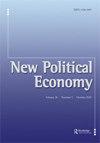Growth models in Europe’s Eastern and Southern peripheries: between national and EU politics
IF 3.8
2区 经济学
Q1 ECONOMICS
引用次数: 1
Abstract
ABSTRACT This paper analyses the political origins of diverse peripheral growth models in Europe, focusing on debt-based consumption-led growth model in Southern Europe and FDI-based export-led growth model in Central and Eastern Europe. Contrary to existing approaches that attribute this East-South divergence to their geographic position and systemic features of European monetary integration, the paper argues that these growth models stem from different national and EU-level policy responses to the challenge of core-periphery market integration. While the Southern states sought to protect domestic firms, allowing for, or even directly contributing to deindustrialisation in the face of competition with the European core economies, Central and East European states aimed to preserve their industrial legacy even at the expense of FDI-dependency. These policy responses were, in turn, shaped by distinct patterns of interaction and accommodation between segments of state elites and domestic economic groups, as well as by dramatically different EU strategies of governing integration. In contrast with society-centred perspectives on the politics of growth models, the paper highlights the autonomous role of the state as a key actor balancing between the demands and accommodation of domestic economic groups, and the constraints and opportunities created by regional institutions governing market integration.欧洲东部和南部边缘地区的增长模式:国家和欧盟政治之间
摘要本文分析了欧洲各种外围增长模式的政治根源,重点分析了南欧基于债务的消费导向增长模式和中欧和东欧基于外国直接投资的出口导向增长模式。与将这种东-南差异归因于其地理位置和欧洲货币一体化的系统特征的现有方法相反,本文认为,这些增长模式源于国家和欧盟层面对核心-外围市场一体化挑战的不同政策反应。尽管面对与欧洲核心经济体的竞争,南方国家寻求保护国内企业,允许甚至直接促进去工业化,但中欧和东欧国家旨在保护其工业遗产,甚至不惜牺牲对外国直接投资的依赖。反过来,这些政策回应是由国家精英阶层和国内经济团体之间不同的互动和包容模式,以及截然不同的欧盟治理一体化战略形成的。与以社会为中心的增长模式政治观点不同,本文强调了国家作为平衡国内经济群体需求和适应以及管理市场一体化的区域机构所创造的制约和机会的关键行为者的自主作用。
本文章由计算机程序翻译,如有差异,请以英文原文为准。
求助全文
约1分钟内获得全文
求助全文
来源期刊

New Political Economy
Multiple-
CiteScore
10.10
自引率
9.50%
发文量
41
期刊介绍:
New Political Economy aims to create a forum for work which combines the breadth of vision which characterised the classical political economy of the nineteenth century with the analytical advances of twentieth century social science. It seeks to represent the terrain of political economy scholarship across different disciplines, emphasising original and innovative work which explores new approaches and methodologies, and addresses core debates and issues of historical and contemporary relevance.
 求助内容:
求助内容: 应助结果提醒方式:
应助结果提醒方式:


